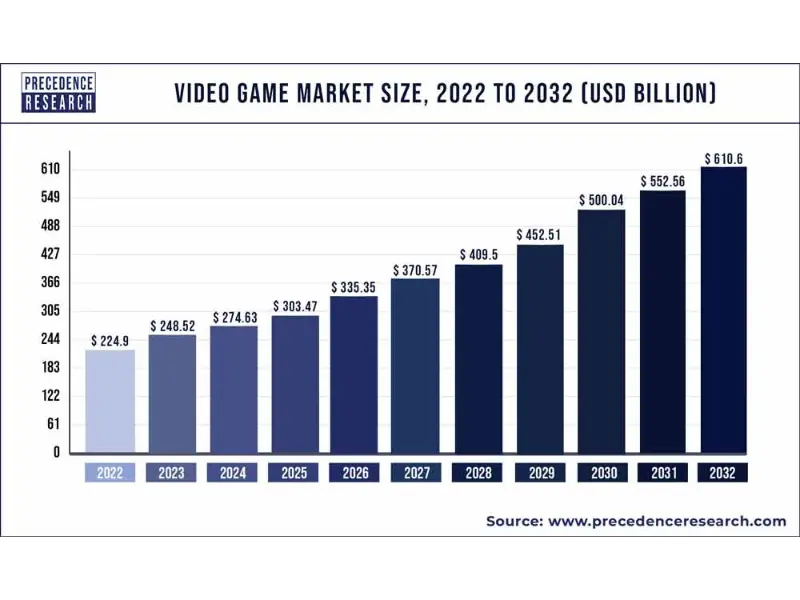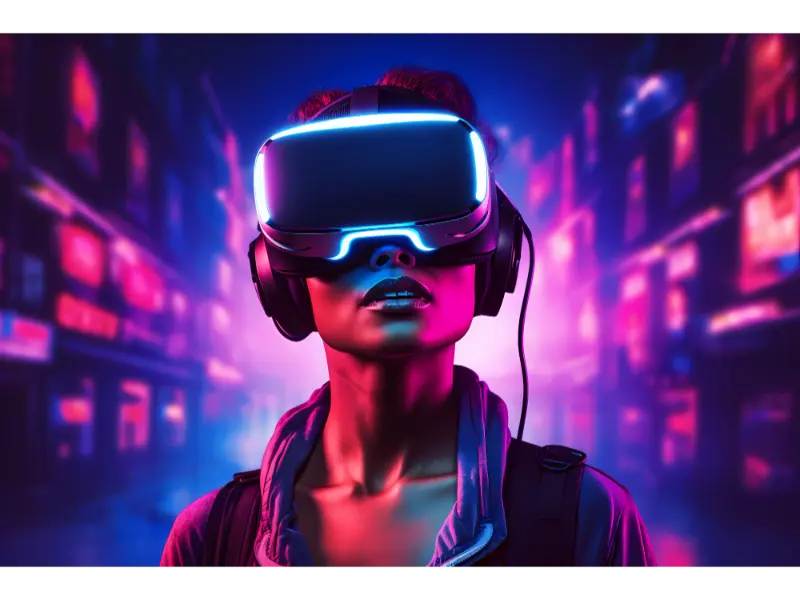- Major tech companies like Microsoft, Tencent, and Sony are reshaping the gaming industry through acquisitions and strategic positioning, reflecting confidence in the sector.
- The gaming industry’s appeal goes beyond financial gains, driven by technological advancements, changing business models, and the rise of mobile and VR gaming.
- The gaming industry acts as a catalyst for technological development, with AI advancements, VR gaming, and game engines influencing various sectors from entertainment and aerospace to medical simulations.
In recent years, major tech giants have been making waves in the gaming industry, with Microsoft’s successful acquisition of Activision Blizzard for a staggering $68.7 billion standing out as a milestone event. Activision Blizzard, a veteran game development company, is not only a pioneer in the industry but also the only company solely dedicated to game development that has achieved a leading market value position. Their groundbreaking game, World of Warcraft, has not only attracted countless gamers worldwide but has also had a profound impact on the entire online gaming industry.

The global gaming community has seen immense growth, with 40% of the world’s population being gamers and over 900 million people tuning in to watch game live streams in 2023. The gaming industry’s market size has reached $240 billion, equivalent to twice the combined value of the film and music industries, and continues to grow at a rate exceeding 10% annually.
This rapid expansion has drawn the attention of global tech companies. Among the top 10 most valuable tech companies globally, seven have close ties to the gaming industry, namely Meta, Apple, Microsoft, Google, Amazon, NVIDIA, Tencent, and have been accelerating their presence in this sector in recent years.
But what makes the gaming industry so attractive? Is it purely the pursuit of profit?
The appeal of the gaming industry
The gaming industry’s appeal extends beyond financial gains. Technological advancements and the convergence of various sectors have contributed to its allure. Three decades ago, the gaming market was relatively simple, with developers creating games and publishers releasing them on major platforms. However, as development costs escalated, major publishers began acquiring smaller developers, leading to vertical integration within the industry. Sony, Nintendo, and Microsoft emerged as the traditional gaming console giants.
Microsoft’s acquisition of Activision Blizzard aimed to bolster its global gaming market revenue, surpassing Sony to become the industry’s second-largest player, trailing only Tencent.
While Sony and Nintendo have traditionally focused on gaming consoles, the rise of mobile devices has propelled smartphones into the forefront of the gaming industry. Tencent, through investments in multiple gaming companies, particularly in the mobile gaming sector, has become one of the world’s largest gaming companies.

The industry’s business model has also evolved, shifting from retail sales to a service-oriented approach, providing free games through in-app purchases and generating revenue through virtual goods sales. This model has seen tremendous success globally. Epic Games, in which Tencent has invested, is a prime example. Its flagship game, Fortnite, has generated over $5 billion in annual revenue through in-app purchases. Furthermore, Epic Games’ Unreal Engine game engine has transcended into different industries such as film and aerospace.
Pop quiz:
What are the top three biggest video game companies in the world?
See the answer at the bottom of this article.
The advancement of AI technology in game development
Advancements in AI technology have revitalized the game development landscape.
Generative AI enables game developers to automatically generate various elements within games, including levels, maps, characters, and items. Google’s DeepMind has successfully trained an AI system capable of generating game maps resembling those in “StarCraft.”
Additionally, AI can be used to create intelligent game characters, enhancing gameplay challenges and enjoyment. OpenAI’s GPT-3 has been employed to create game characters with complex dialogue capabilities.
AI also automates game testing, identifying bugs and performance issues, offering data support for game optimization.
Moreover, AI is utilized to create virtual assistants within games, providing players with guides and task prompts.
Leading game companies are continuously exploring AI technology applications, resulting in increasingly powerful game development tools.
The rise of VR gaming and its implications
In recent years, VR gaming hardware and tracking technologies have advanced significantly, coupled with ongoing innovations in game content. These advancements have provided players with more immersive gaming experiences and propelled the popularity and development of VR gaming.
Notably, tech giants like Huawei, ByteDance, and Meta have actively ventured into the VR headset domain, introducing their own VR headset products and accelerating VR technology development through investments in related tech companies.
Meta, formerly Facebook, has made substantial investments in the headset field, having acquired Oculus VR in 2014. ByteDance has also made strides in the headset sector, investing in multiple VR and AR-related companies, and launching its own VR headset product, the Pico Neo 3. Huawei has entered the headset domain with its VR headset product, the Huawei VR Glass.

Also read: Apple Vision Pro headset launch: Delayed, yet predicted spectacle
Huawei views VR gaming as the next growth opportunity in the gaming industry and plans to increase its investments and presence in the VR gaming field to seize early market advantages.
The burgeoning VR gaming market has captured the attention and investment of numerous tech giants, driving advancements in VR gaming experiences and presenting new opportunities and challenges for the entire gaming industry.
The gaming industry as a catalyst for technological development
The gaming industry not only brings immense entertainment value to players but also provides vast development opportunities for tech companies.
For instance, NVIDIA, renowned for its gaming graphics cards, has expanded its business beyond gaming into the AI chip market, leveraging its technological advantage in the graphics processing field to enter the AI chip market. Today, NVIDIA’s GPUs have become crucial computational tools in the field of AI, widely applied in autonomous driving, deep learning, and data science.
Tencent, owner of several renowned games, has not only reaped significant profits from its games but has also propelled its technological development in areas such as AI and cloud computing.
Real-time rendering capabilities of game engines have introduced new possibilities in various fields, including film special effects and aerospace simulations. Wētā FX, (formerly known as Weta Digital), a U.S. film production company, utilized the Unreal Engine 5 to create parts of the special effects for the movie “Star Wars: The Rise of Skywalker” and “Avatar 2.”
The U.S. National Aeronautics and Space Administration (NASA), in collaboration with Epic Games, utilized the Unreal Engine 5 to create a virtual environment of Mars, aiding scientists in researching Martian resources. This virtual environment simulates the temperature, climate, and terrain conditions of the Martian surface, enabling scientists to conduct resource exploration and research.

In the medical field, the Unreal Engine 5 has been used to create highly realistic medical simulation scenarios, aiding in the training of doctors and nurses. The Virtual Reality Medical Center in the U.S. has utilized the Unreal Engine 5 to develop multiple medical simulation games, facilitating the training of medical professionals in surgical procedures and treatments.
Also read: Is XR the future of healthcare? Surgery, mental health, and brain rehab say yes
The emergence of the Unreal Engine 5 has sparked a transformative wave in the technology sphere. Its grandiose game visuals and meticulous detail immersion have created a seamless integration of real and virtual worlds.
The Unreal Engine is a game development tool known for its powerful lighting effects and object detail handling. It employs AI ray tracing technology, producing lifelike shadow effects as light moves through different scenes, creating an experience akin to being immersed in the real world. Furthermore, the engine enables developers to freely utilize various object models, crafting diverse game worlds.
While the application of game engines is currently concentrated in specific fields, they hold the potential to become essential tools for many industries as the virtual and real worlds continue to converge.
Several national governments have now recognized the potential and value of the gaming industry, incorporating gaming into national development strategies. The European Union has enacted gaming legislation, Saudi Arabia has officially included e-sports in its national plan, and South Korea has consistently supported the development of the gaming industry since the Asian financial crisis.
Watch tech titans envisioning the digital future
The gaming industry serves not only as a vast entertainment market but also as a convergence point for technology, culture, and commerce. The sustained strategic positioning of giants such as Microsoft, Tencent, and Sony reflects their confidence in this industry, while the rise of game engines promises further possibilities for the future. In this vibrant industry, the power of games goes beyond the screen, propelling technological innovation and advancement.
Tech giants have fervently immersed themselves in the gaming landscape, aiming to shape the digital world of the future. This battle concerns not only commercial interests but also the quest for dominance in the upcoming digital era.
Games, have become a bridge to the future.
Answer to the quiz: Tencent, Microsoft, Sony.

